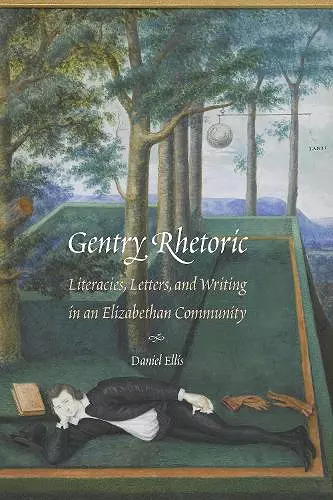Gentry Rhetoric
Literacies, Letters, and Writing in an Elizabethan Community
Format:Hardback
Publisher:University of Nebraska Press
Published:1st Dec '22
Should be back in stock very soon

Gentry Rhetoric examines the full range of influences on the Elizabethan and Jacobean genteel classes’ practice of English rhetoric in daily life. Daniel Ellis surveys how the gentry of late sixteenth- and early seventeenth-century Norfolk wrote to and negotiated with each other by employing Renaissance humanist rhetoric, both to solidify their identity and authority in resisting absolutism and authoritarianism, and to transform the political and social state. The rhetorical training that formed the basis of their formal education was one obvious influence. Yet to focus on this training exclusively allows only a limited understanding of the way this class developed the strategies that enabled them to negotiate, argue, and conciliate with one another to such an extent that they could both form themselves as a coherent entity and become the primary shapers of written English’s style, arrangement, and invention.
Gentry Rhetoric deeply and inductively examines archival materials in which members of the gentry discuss, debate, and negotiate matters relating to their class interests and political aspirations. Humanist rhetoric provided the bedrock of address, argumentation, and negotiation that allowed the gentry to instigate a political and educational revolution in seventeenth- and eighteenth-century England.
"A fine book, and one that deserves study by anyone interested in the history of rhetoric."—Dr. Cliff Cunningham, sunnewsaustin.com
“Daniel Ellis advances a fascinating argument that the Norfolk gentry during the Elizabethan and Jacobean periods drew from their formal rhetorical training in ways that met emerging practical needs, including the development of a collective identity and negotiations about land and legal matters, and also shaped the emergence of early modern rhetoric through those very practices. This complex and nuanced argument will be of interest not only to historians of rhetoric but also to a broader group of scholars in the fields of literary, literacy, rhetorical, and communication studies who are interested in the intersections of theories and practices of writing and communication and the material conditions in which those practices are situated.”—Lois Peters Agnew, author of Outward, Visible, Propriety: Stoic Philosophy and Eighteenth-Century British Rhetorics
“Gentry Rhetoric helps us to see how the rhetorical theory and the standard methods of teaching rhetoric were taken up or ignored by a large and influential class of people. Additionally, this study helps us to see people in their daily lives, using language to accomplish necessary tasks. Finally, this study explores the vital role that practical language use plays in identity formation and social cohesion. The gentry existed as a class because they developed a language and a set of literacy practices that they could share and use to address their day-to-day lives.”—Mark Garrett Longaker, author of Rhetorical Style and Bourgeois Virtue: Capitalism and Civil Society in the British Enlightenment
ISBN: 9781496221186
Dimensions: unknown
Weight: unknown
234 pages